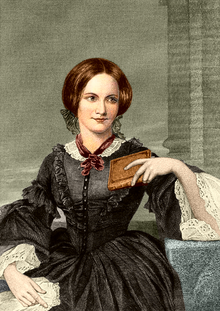On March 5, 1839, Charlotte Bronte writes to the Reverend Henry Nussey, declining marriage. The 23-year-old Bronte told him that he would find her "romantic and eccentric" and not practical enough to be a clergyman's wife. Charlotte was born in 1816, one of six siblings born to an Anglican clergyman. When she was five, the family moved to the remote village of Haworth on the moors of Yorkshire. The gloomy parsonage produced some of the best-known novels in English literature. Bronte's mother died in 1821, and Charlotte and her older sisters were sent to the Cowan Bridge School, a cheap boarding school for daughters of the clergy. However, Charlotte was brought home, where she and her siblings, Branwell, Emily, and Anne, invented and wrote about elaborate fantasy worlds to amuse themselves.
Shortly after declining the proposal of Reverend Nussey,
Charlotte went to Brussels with her sister Emily to study languages and school
administration. Returning to the parsonage at Haworth, the sisters attempted to
set up their own school, but no pupils registered. Meanwhile, their adored
brother Branwell was becoming a heavy drinker and opium user. He eventually
died from tuberculosis. In 1846, Charlotte ran across
some poems that Emily had written, which led to the revelation that all three
sisters were secret poets. The sisters published their own book, Poems by
Currer, Ellis and Acton Bell. Only two copies sold, but publishers became
interested in the sister’s other works. Charlotte, under the pen name Currer
Bell, published Jane Eyre in 1847. Emily's Wuthering Heights and
Anne's Agnes Grey were published later that year. Sadly, all three of
Charlotte's siblings died within the next two years. Left alone, Charlotte
cared for her ill father and married his curate, Arthur Bell Nicholls, just a
year after she published Villette, a novel inspired by a failed romance
she had in Brussels years before.
Charlotte
became pregnant soon after the marriage but her health declined rapidly. She died
with her unborn child on March 31, 1855, aged 38. She may have died from
dehydration and malnourishment, caused by excessive vomiting from severe morning
sickness. There is evidence to suggest that Charlotte might have died from typhus
which she may have caught from a household servant. Charlotte was interred in
the family vault in the Church of St. Michael and All Angels at Haworth.



No comments:
Post a Comment